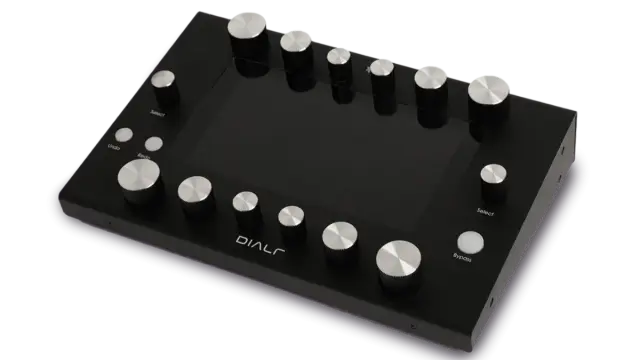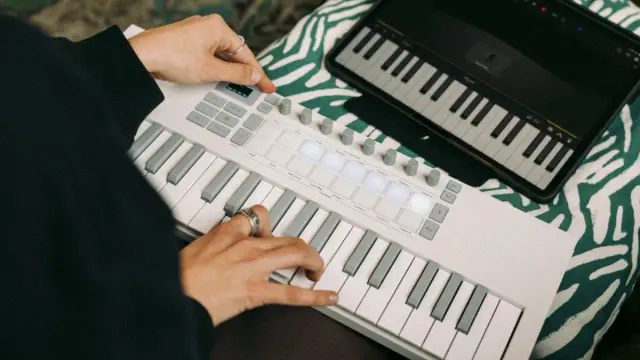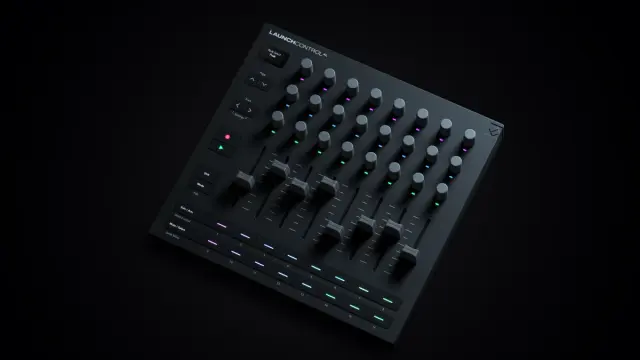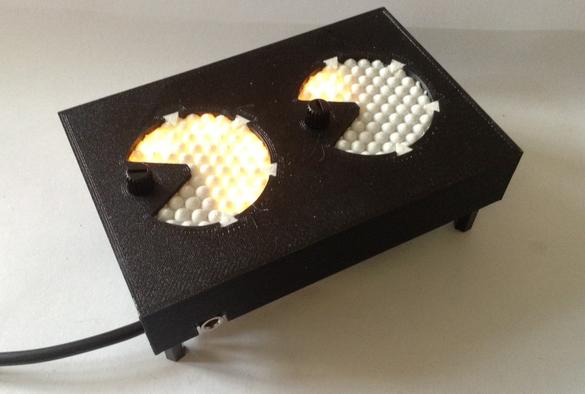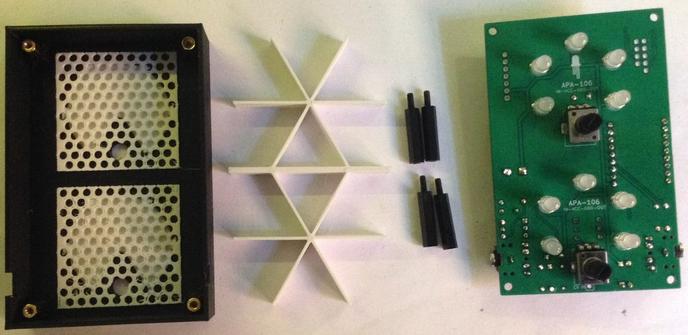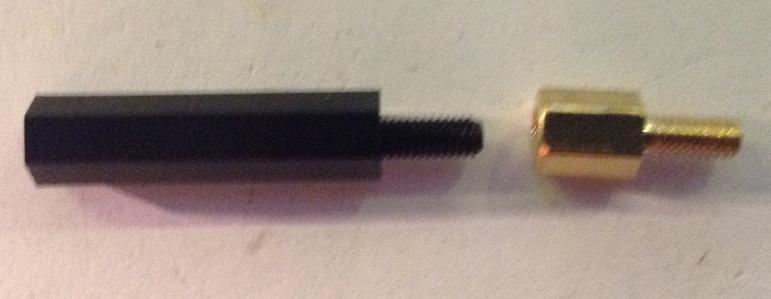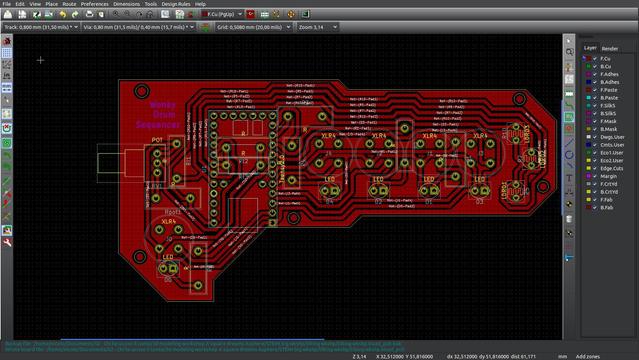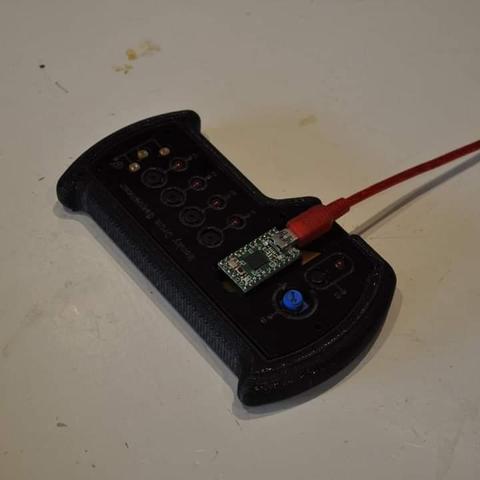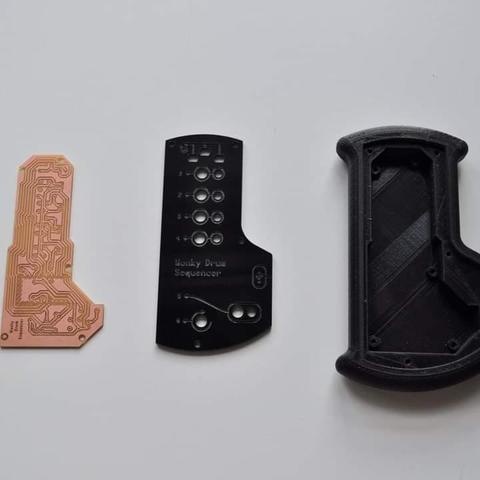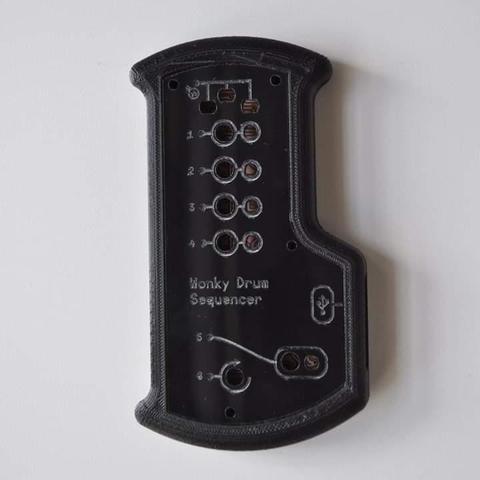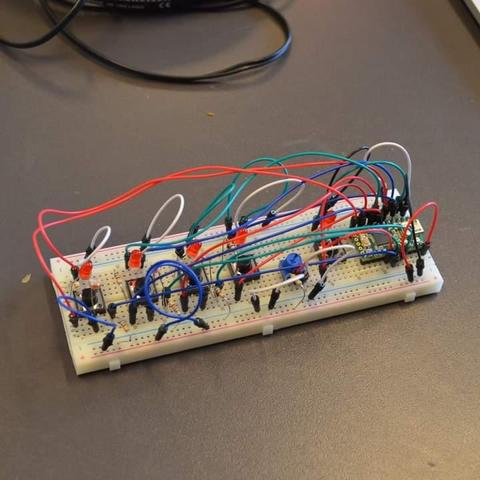Recording hickups
As you can probably tell, I haven't figured out how to record this stuff smoothly.
Seems like streaming is a lot less taxing on my machine...
Wondering what you're looking at? Go check out my blog, there's a fresh article on all of this and more. Just for you.
#vj #resolume #touchdesigner #midicontroller #resoctrl #hydractrl #hydrasynth
https://www.d17e.dev/blog/how-i-ended-up-building-hydractrl/
#MIDIcontroller
Everything under control
Don't worry, I know what I'm doing.
If you're wondering what on earth is going on, my latest blog post might shed some light.
#vj #resolume #touchdesigner #midicontroller #resoctrl #hydractrl #hydrasynth
https://www.d17e.dev/blog/how-i-ended-up-building-hydractrl/
VJ Setup POV
I remembered I had these cheap cameras lying around...
What better way to promote a blog article about my vj setup with a lil vj jam of said vj setup? If you can think of something, I'd love to hear it!
But for now, go read my blog post!
Please 🙏
#vj #resolume #touchdesigner #midicontroller #resoctrl #hydractrl #hydrasynth
https://www.d17e.dev/blog/how-i-ended-up-building-hydractrl/
The MIDI Guitar 3: Five Dimensions of Touch • MPE for Guitar
w/ Thorleif “LoFiLeiF” Markula
#Music #Experimental #MIDI #MPE #MIDIController #Guitar
https://www.youtube.com/watch?v=T2FIGgoSwDA
Der Dialr von Producely ist der weltweit erste MIDI-Controller, der sich mit Hilfe von Künstlicher Intelligenz automatisch auf das aktive Plug-in mappt.
Endlich Schluss mit dem nervigen manuellen Zuweisen von MIDI-Controllern! Das versprechen zumindest Producely mit ihrem laut eigenen Aussagen weltweit ersten KI-gesteuerten MIDI-Controller namens Dialr. Das Gerät nutzt KI, um Plug-ins (VST 3 und AU) zu erkennen und entsprechende Mappings aus einer Cloud zu beziehen. Diese können alternativ dazu auch lokal gespeichert und somit offline genutzt werden.
[…]
Electribe ESX VST controllerplugins
Heute beginnt die Superbooth25 in Berlin und Novation präsentieren gleich drei Produktneuheiten: Launch Control XL 3, Bass Station II Special Editon und Launchkeys in weiß.
Von heute an bis einschließlich Samstag findet wieder die Superbooth in Berlin statt. Die Messe für elektronische Instrumente und Musik ist für viele Hersteller ein Anlass, ihre neuen Produkte zu präsentieren. Novation ist einer dieser Hersteller – und der hat gleich drei neue Produkte im Gepäck…
[…]
Check out this new browser-based editor for the #faderfox EC4 #midicontroller :
https://lsim.github.io/faderfox-editor
It may look familiar but it has a few new tricks up its sleeve!
Forbidden Planet “Krell” Display – MIDI CC Controller – Part 2
This revisits my Forbidden Planet “Krell” Display – MIDI CC Controller using my Forbidden Planet “Krell” Display PCB with a Waveshare RP2040 to create more of a “all in one” device.
Warning! I strongly recommend using old or second hand equipment for your experiments. I am not responsible for any damage to expensive instruments!
If you are new to Arduino, see the Getting Started pages.
Parts list
- Updated Forbidden Planet “Krell” Display (see below).
- Completed Forbidden Planet “Krell” Display PCB Build
- Waveshare Zero format device (I’m using an RP2040)
- 4x 6mm brass spacers
- 4x 20mm nylon spacers
PCB
This requires a built of the Forbidden Planet “Krell” Display PCB with the following:
- 2 potentiometers
- MIDI IN and OUT
I’ve used potentiometers that are their own knob, as they only poke through the casing by around 5mm or so.
If it you are able to get longer shaft pots, then that would probably be worthwhile.
Updated 3D Printed Case
This requires the following from the Krell Display 3D Printed Case:
- 1x Frame
- 2x Inserts (with potentiometer holes)
- 1x EuroRack support
This requires the following options in the OpenSCAD code:
show_frame = 1;
show_quadframe = 0;
show_insert = 1;
show_support = 0;
show_quadsupport = 0;
show_eurorack = 0;
show_eurorack_support = 1;
alg_pot1 = 1;
alg_pot2 = 1;
alg_cv = 0;
The frame does not really take into account the PCB at present, but I’ve reached the “good enough I want to do something else” stage, so I’ve just added a couple of small cut-outs (using a hacksaw) for the two MIDI sockets, and am content that the components stick out a bit from the back.
This cutout has to be 10.5mm from the end, 6mm wide, and 5mm deep.
At some point I might go back and design a deeper frame that has the cut-outs included and some kind of snap-on back to make it a self-contained box.
But for now, this is left as an exercise for, well, anyone else 🙂
Construction
I’ve used four brass 6mm spacers to screw into the mounting holes in the frame. Then the PCB can be inserted, taking care to squeeze in the 3D printed support around the LEDs and pots, and fixed with 20mm spacers which will also act as “legs”.
The Code
I’ve used a Waveshare Zero RP2040 and Circuitpython for this build. This is a combination of some of the test code used for the Forbidden Planet “Krell” Display PCB but with added MIDI.
The code supports both Serial and USB MIDI.
I wanted an equivalent of the Arduino map() and constrain() functions and didn’t immediate spot them in Circuitpython so wrote my own:
def algmap(val, minin, maxin, minout, maxout):
if (val < minin):
val = minin
if (val > maxin):
val = maxin
return minout + (((val - minin) * (maxout - minout)) / (maxin - minin))
This allows me to map the analog read values (0 to 65535) down to MIDI CC values (0 to 127) whilst also allowing for some inaccuracies (I’ve treated anything below 256 as zero for example):
alg1cc = int(algmap(alg1_in.value,256,65530,0,127))
I’ve used the Adafruit MIDI library, which I’m still not really a fan of, but I wanted to include MIDI THRU functionality to allow the controller to sit inline with an existing MIDI stream. But it doesn’t seem to work very well.
I was already only updating the LEDs/MIDI CC if the pot values had changed, to cut down on the number of Neopixel writes required.
I experimented with changing the scheduling of the analog reads and MIDI but that didn’t seem to help very much. In the end I made sure that all MIDI messages queued up in the system would be read at the same time before going back to checking the pots.
msg = midiuart.receive()
while (msg is not None):
if (not isinstance(msg, MIDIUnknownEvent)):
midiuart.send(msg)
msg = midiuart.receive()
It will do for now. Moving forward, I might try the Winterbloom SmolMIDI library. If that still doesn’t give me some useful performance then I might have to switch over to Arduino C.
Closing Thoughts
The MIDI throughput is disappointing, but then I’ve never really gotten on with the Adafruit MIDI library. I use it as USB MIDI on Circuitpython is so easy, so will need to do something about that.
I’m still deciding on the PCB-sized supports too. The original seemed to have nicer diffusion of the LEDs, but that could have been the difference between 5mm SMT neopixels and these THT APA106s which seem more directional in the first place.
And I really ought to finish the 3D printed case properly too.
So this is “that will do” for now, but I ought to come back and finish it off properly at some point.
Kevin
#APA106 #circuitpython #ForbiddenPlanet #Krell #midi #midiController #NeoPixel #potentiometer #rp2040 #WaveshareZero
MIDI Association members Expressive E, makers of the Osmose keyboard and the Touché Controller have released a video explaining the benefits of MPE (Midi Polyphonic Expression)
#Science #Engineering #Music #MIDI #Controller #MIDIController #MPE #Synth #Synthesizer
https://midi.org/expressive-e-explains-mpe
If you're interested in my attempt to build an ocarina MIDI controller, I've written a few blog posts about how it's going. TL:DR slow but productive https://elypeddler.wordpress.com/category/ocarina-midi-controller/
#midicontroller #midi #ocarina
Studiologic haben auf der NAMM 2025 die SL-mk2-Serie vorgestellt. Die neuen MIDI-Controller-Keyboards kommen mit verbesserten Klaviaturen, MIDI 2.0, integriertem Audio-Interface und vielem mehr.
Auf der NAMM 2025 haben Studiologic ihre neuen MIDI-Controller-Keyboards der SL-Serie präsentiert. Die mk2-Modelle des SL73, SL88 und SL88 GT sind vollständig mit dem hauseigenen Numa Player 2 kompatibel und unterstützen MIDI 2.0. Zudem wurden die Klaviaturen getauscht, sodass das SL73 und SL88 nun eine gewichtete TP/110-Tastatur mit Hammer-getriggertem Aftertouch besitzen.Das SL88 GT hat eine TP400-Klaviatur mit Holzbett spendiert bekommen, das sehr nahe an das Spielgefühl eines akustischen Grand Pianos kommen soll.
[…]
Had insane fun playing my live set at Blitz club in Munich yesterday 🥁 love this venue so dearly, and the dancers were amazing. Thanks for your ongoing support and energy 💕
:kirby:
#liveset #techno #electronicmusic #dancemusic #ableton #midicontroller #musicproduction #munich
I'm investigating building a midi controller in the form of an ocarina. It felt like a simple thing but is turning into a bit of a can of worms. Might help if I had more than a very basic idea of how midi works. Oh well. Every day's a school day. #midicontroller #midi #ocarina
How is this even a MIDI Guitar?
A discussion about MIDI/MPE controllers with host Thorleif “LoFiLeiF” Markula
#Music #Experimental #MIDI #MPE #MIDIController #Guitar
https://www.youtube.com/watch?v=a2zIylWif68
So apparently nobody at #Arturia thought that there's anything wrong with shipping a product which has endless encoder knobs, but those encoders can only act as non-endless knobs 🤦♂️
As a fresh Minilab 3 owner, having to tweak around to find the takeover point is already driving me insane. Apparently they added a way to get the encoders into relative mode in a firmware update, but it involves losing DAW integration features. All I can say is: Bruh
#musicproduction #midicontroller
My trusty old Korg padKontrol, which has been my fingerdrumming device for ages, has started to not be as trusty anymore.
I have tried plenty of other drumpads through the years, but I have never found anything that comes close.
My main issue seems to be the sensitivity level of the padKontrol. You can play so dynamic, from barely touching the controller to hitting it hard. To me it feels like all other devices goes from hard to really hard.
A look inside the design of the Wonky Drum Sequencer—an experimental MIDI controller created in KiCAD . #WonkyDrumSequencer #KiCAD #ElectronicsDesign #MidiController #OpenSourceHardware #DIYElectronics #ElectronicMusic #MusicTech #HardwareDesign #CircuitDesign #SoundEngineering #DigitalInstruments #MakersGonnaMake #CreativeTech #ExperimentalMusic #SynthDesign #ElectronicArt #TechInnovation #MusicMakers #InteractiveDesign
Looking back to when I designed and built (with Ftank Balde) the "Wonky Drum Sequencer". a MIDI controller that adds a new twist to drum sequencing. This project became the foundation for workshops I led at STEIM, exploring new approaches to rhythm and sound. Grateful to the Dutch Creative Industries Fund for supporting these courses and helping make these creative sessions possible. @stimuleringsfonds #WonkyDrumSequencer #STEIM #DutchCreativeIndustriesFund #MidiController #ElectronicMusic #SoundDesign #CreativeTechnology #MusicWorkshops #DigitalInstruments #ExperimentalMusic #MusicTech #DIYInstruments #ElectronicArt #SoundExploration #InteractiveArt #InnovationInMusic #CreativeCoding #TechArt #ArtAndTechnology #NewMediaArt
